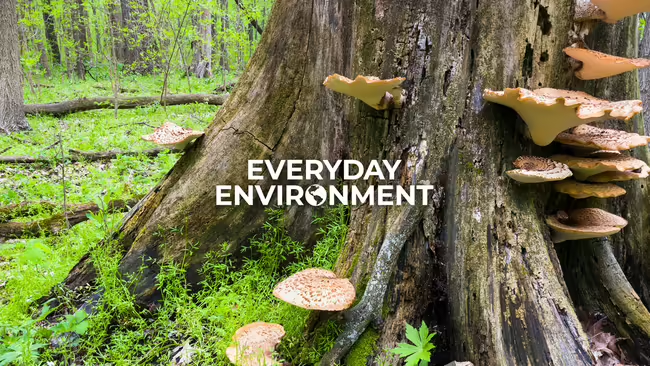
There's more to mushrooms than meets the eye.
Fungi are more than a pathogen eating your trees or the mushroom in your meals. Not a plant or an animal, fungi are dynamic organisms that help decompose and recycle the nutrients in organic materials and form beneficial relationships with plants. About 400 million years ago, fungi were the catalyst that prompted life to move from the sea to land. Today, fungi contribute to resilient ecosystems in the face of climate change. Discover the vital role the unassuming fungus has in connecting and balancing Illinois ecosystems.
Presenter
Karla Griesbaum, natural resources, environment, and energy educator
About the Everyday Environment Series
Small changes have positive impacts on the environment. There is never a shortage of new things to learn about your everyday environment. The Everyday Environment Webinar series features a different environmental topic each month. Do your part to protect the planet for generations to enjoy. All sessions are free and take place on the second Thursday of the month at 1 p.m. Learn more about the series and register for individual events at go.illinois.edu/EverydayEnvironment.
More Sessions
Do’s and Don’ts for Managing Invasive Plants in the Spring
April 11 | 1pm CT
Non-native invasive plants can cause a lot of damage in backyards and wild spaces across Illinois and managing them is a year-long endeavor. Some management activities are best suited for spring, such as garlic mustard control or surveying for invasive bush honeysuckle. Other tasks are more effective later in the year, such as removing invasive woody plants. Explore invasive plant phenology, identification, the most effective timing for management, and best practices for springtime control. Register at go.illinois.edu/invasiveplantsinspring
Microplastic Pollution: The Big Problem with Tiny Plastic
May 9 | 1pm CT
Plastic is the most common debris found in oceans and lakes. Microplastics are smaller than a grain of rice and scientists don’t fully understand their impact on aquatic ecosystems, especially in the Great Lakes. Researchers are exploring the scope of the problem, as well as what potential impacts microplastics might have on human and environmental health. Explore where microplastics come from, what we know about the consequences of microplastic pollution, and steps anyone can take to help solve this complex plastic problem. Register at go.illinois.edu/microplastics.